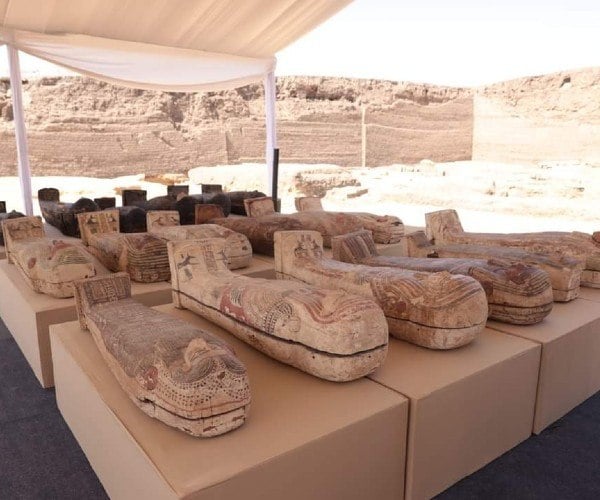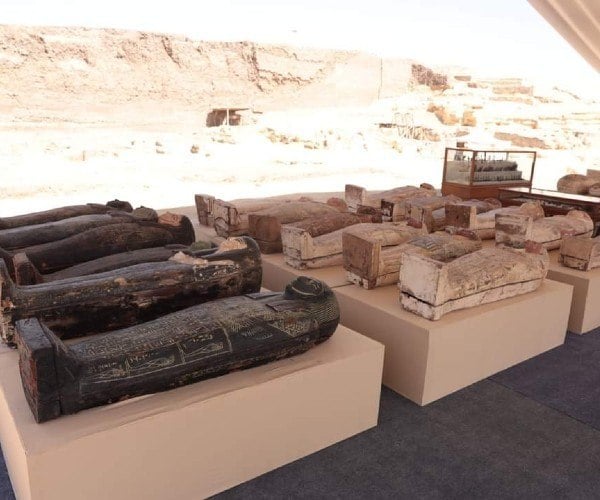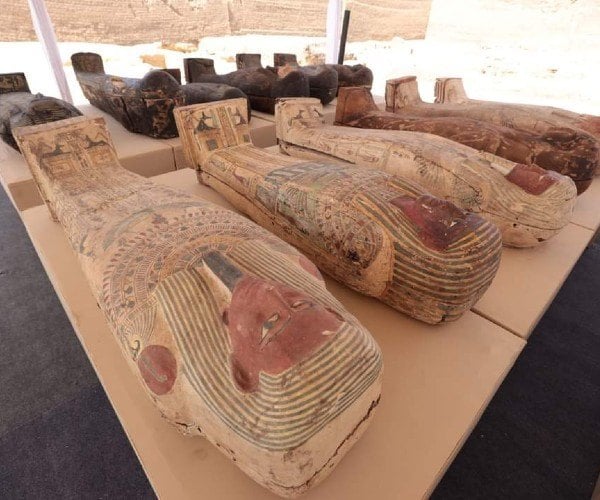Hundreds of colourful sarcophagi discovered at Saqqara
Ancient Egyptian dynasties buried its aristocracy beneath the desert sand for thousands of years, frequently surrounding them with treasures and trinkets to take with them into the afterlife. The necropolis of Memphis, some 15 miles southwest of Cairo, was the site of the ancient city’s burials.
The archaeological site of Saqqara is where they buried their dead today, and the tremendous extent of the ancient city of the dead is still being revealed. A recent discovery should be of assistance: Researchers recently discovered a treasure trove of items from the site, including hundreds of antique sarcophagi in which the well-heeled dead of ancient Egypt were buried.
More than 250 sarcophagi, 150 bronze statues, and a variety of other antiquities were unearthed from the site this week, as per experts from Egypt’s Ministry of Tourism and Antiquities. According to the experts, the surprisingly well-preserved artifacts in the necropolis are still in good—and occasionally colorful—condition.
Bronze statues of ancient Egyptian gods such as Anubis, Osiris, Nefertem, Isis, and Hathor, 40 wooden coffins with mummies sealed inside, traces of a burial with bronze and brass ornaments and adornments, and more are among the discoveries.

In a televised event on Monday, Mostafa Waziri, secretary-general of Egypt’s Supreme Council of Antiquities, exhibited part of the treasure, comprising 35 painted wooden coffins, at the Unesco Heritage site south of Cairo. The sarcophagi, which date back over 2,500 years to the Late Period, are in good shape and all contain mummies.
The Egyptian archaeological mission has discovered the biggest number of coffins and bronze statues at the location near the famed Step Pyramid of Djoser.
Mr. Waziri remarked, “I’m quite proud that Egyptians made the find, and this will not be the final discovery here.”
Excavation director Mohamed Al Saidi told CBS News’ Ahmed Shawkat, “We found two lovely wooden figurines with gilded faces of the deities Isis and Neftis, designated the protectors of the coffin.” “They were seated [by one coffin], one by the head and the other by the feet, in a position known as ‘the mourners’ or ‘weepers’ for the deceased.”
Another discovery at the site may give even more information about ancient Egyptian burial customs. The crew discovered a papyrus scroll estimated to be up to 30 feet long inside the coffin protected by Isis and Neftis, which could contain elements of the “Book of the Dead”—a compilation of ancient Egyptian literature loaded with spells and formulas thought to safeguard the dead.
Because of the numerous statues of the ancient Egyptian cat-goddess Bast discovered there, the cemetery where the coffins and statues were discovered was originally called after her. The site was renamed the Cemetery of Sacred Animals in 2019 due to the continuing discovery of statues of additional gods and mummified animals.
According to Al Saidi, the latest discoveries “prove] that the temple wasn’t just for cats, but also for other Egyptian deities.”
IMPORTANT NOTICE:
If you are reading this article anywhere other than on A Luxury Travel Blog, then the chances are that this content has been stolen without permission.
Please make a note of the web address above and contact A Luxury Travel Blog to advise them of this issue.
Thank you for your help in combatting content theft.
Egypt’s Tourism Sector Is Bouncing Back
According to the Associated Press, Egyptian antiquity officials allowed the press to get a close look at the countless artefacts at a pop-up exhibit near the base of the Step Pyramid of Djoser. According to Rachel Pannett of the Washington Post, the findings will eventually be transferred to the Grand Egyptian Museum in Cairo when it opens in November. According to the Washington Post, Egypt’s government believes the discoveries would resurrect the country’s tourism industry, which has been battered by political turmoil, pandemic-related travel restrictions, and Russia’s invasion of Ukraine. (Egyptian tourists from Ukraine and Russia account for a considerable percentage of the country’s annual visitors.)

However, Saqqara may have what it takes to entice travelers interested in Egypt’s past. According to Jo Marchant of Smithsonian magazine, the necropolis is unlike other ancient Egyptian aristocracy burial places. Other cemeteries may include elaborate, vast tombs for individuals or families. Saqqara, on the other hand, is known for its “mega tombs,” which are filled with hundreds of pricey coffins. While the site’s discoveries span 3,000 years, from the period of the earliest pharaohs to the Roman conquest of Egypt, the majority of the sarcophagi discovered date from ancient Egypt’s Late Period, which lasted from 525 to 332 B.C.E.

Egypt only received 3.6 million tourists in 2020, less than a quarter of the number who arrived in 2019, when the pandemic wiped away $17.6 billion from the Egyptian economy and resulted in the loss of 844,000 travel and tourism employment. However, when travel with health precautions resumed around the world, numbers increased.
Sherif Khalil is Owner of Dunes & Beyond. Dunes & Beyond offers luxury tours, Nile cruises and desert safaris in Egypt.
If you would like to be a guest blogger on A Luxury Travel Blog in order to raise your profile, please contact us.
Did you enjoy this article?
Receive similar content direct to your inbox.


When you think about it, it is lucky that the great Egyptian civilisation was based in such a dry climate. Elsewhere in the world so many of these treasures would have rotted away and been long gone.
Another thing that is really good after all these years is that the colours can still be made out.
It’s amazing how many new discoveries keep turning up. Is that because the searches are now so much more scientific?